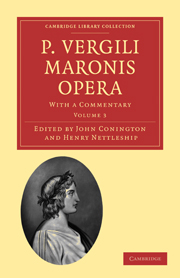EXCURSUS TO BOOK XII. ON THE LENGTHENING OF SHORT FINAL SYLLABLES IN VIRGIL
Published online by Cambridge University Press: 29 August 2010
Summary
The fact that Virgil allowed himself certain licences in the way of lengthening. short final syllables, licences which were wholly or in great part avoided by his immediate predecessors in poetry, has, as was natural, often been noticed. The most detailed discussion of the matter is that of Philip Wagner in No. XII. of his Quaestiones Vergilianae. Gossrau has a paragraph upon it in the “Excursus de Hexametro Vergilii” affixed to his edition of the Aeneid of 1846: but this paragraph is, as the writer himself professes, little more than a simpler reproduction of what Wagner had said. The subject is treated briefly by Lachmann (on Lucr. 2. 27) and comprehensively by Lucian Miiller (De Ee Metrica, p. 324—333): but A. Weidner (Commentar zu Vergil's Aeneis I. und II.) takes no notice of the instances occurring in those books. While Ph* Wagner and Lucian Miiller would account for these licences almost entirely on the ground of the position of the word in the verse, the Plautine critics (Ritschl, Fleckeisen, and W. Wagner) have thought that in some cases at least Virgil was not unconscious of the same uncertainty of quantity which prevailed in the earlier period of Latin poetry. The object of this paper is to show that neither explanation is wholly true: that Virgil, though probably unconscious of any grammatical or etymological propriety in the employment of these scansions, and though always anxious to consult the requirements of metrical elegance, still did not employ them without due selection and a regard to the usage of the earlier writers, however imperfectly the reasons of this usage were understood in his own day.
- Type
- Chapter
- Information
- P. Vergili Maronis OperaWith a Commentary, pp. 465 - 470Publisher: Cambridge University PressPrint publication year: 2010First published in: 1871

